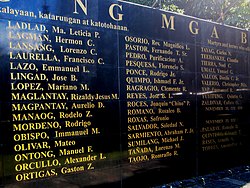The topic of this article may not meet Wikipedia's notability guideline for biographies .(March 2021) |
Romraflo Taojo | |
|---|---|
 Detail of the Wall of Remembrance at the Bantayog ng mga Bayani, showing names from the first batch of Bantayog Honorees, including that of Romraflo Taojo. | |
| Born | Romraflo Rosaroso Taojo February 4, 1955 |
| Died | April 2, 1985 (aged 30) |
| Nationality | Filipino |
| Other names | Dodong Taojo |
| Alma mater | University of Mindanao University of the Visayas |
| Parent(s) | Romeo Taojo Isidra Rosaroso |
Romraflo R. Taojo (February 4, 1955 - April 2, 1985) [1] [2] was a Filipino labor and human rights lawyer, [3] activist, and educator best known for his work with the Free Legal Assistance Group, [4] where he pursued human rights cases against military personnel who were implicated in torture cases. He was killed on April 2, 1985, when unidentified gunman entered his apartment in Tagum, Davao Del Norte, and shot him five times in the eyes and mouth. [5] The gunmen were believed to be part of a paramilitary group acting on orders from the military. [6]
In 1992, Taojo was one of the first "65 martyrs" honored by having his name inscribed on the wall of remembrance at the Philippines' Bantayog ng mga Bayani, which recognizes heroes and martyrs who fought against Ferdinand Marcos and his martial law regime. [2] [7]